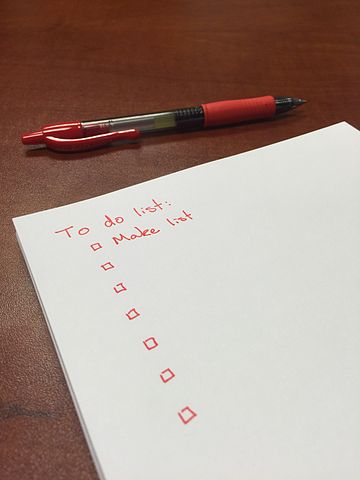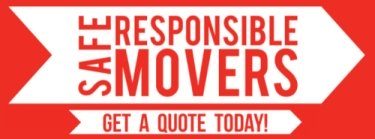Follow these Four Tips for Moving to make your move quick and painless: The Four Moving Commandments
Here are a few tips for moving that can make your relocation easy and painless. Because . . . let’s not beat around the bush. Moving can be hell. Drumming up the motivation to keep on top of every little thing that a big move requires can break any human emotionally, physically, and, of course, financially.
However, if properly planned, the daunting task of packing can help you achieve an almost a zen-like balance. Cleaning and clearing your home of of all your possessions, all the while giving you peace of mind. One could call it, perhaps, a moving experience? (Extra tip: Why not donate your excess furniture to those in need? It’s a great way to get rid of old stuff, often for free!)
Below are four tips for moving compiled by some of us here at Safe Responsible. We’ve found these moving commandments to be true and tested methods to help us help you save time and money.
First Tip: Plan Your Attack
Start getting organized. The best way to do that is to go from biggest to smallest. When moving day comes, you will want to have a map or a floor design. Label rooms properly with the destinations for all the larger items.
It might even help hanging sticky notes, each labeled with the name of each piece of furniture. You can hang these notes on the wall next to the final resting place of your larger pieces. This can eliminate the time during which your movers are idly holding your antique hutch, wondering where look best. Of course, your movers will be happy to help you shuffle some things around if need be, but we’re not interior decorators. (Though we are stylish dressers.)

Listing out all the important tasks can be very helpful before moving day. By Adam Diaz (Own work) [CC BY-SA 4.0], via Wikimedia Commons
Some folks have different ways of labeling boxes and rooms, be it room names (i.e. Jane’s room, Guest Room, Spare Bedroom, Bedroom 1, Bedroom 2, green stickers, yellow stickers, etc.). Again, this helps us save time and save you money — you don’t want to pay for us to stand around, holding heavy furniture and boxes, wondering where they go. On the other hand, we do enjoy improving our strength and stamina.
Second Tip: Cleanse Thy Mind and Thy House of Thy Clutter
Digging through closets, drawers, crawl spaces, and every other forgotten space of your home can unearth some wild findings. Discovering that bag of old band tees you thought your significant other threw out, or perhaps those old dresses you loved until they went out fashion the following season. Maybe even those old roller-blades from when you were going to be the next Charlie Conway in a still-yet-to-be-optioned sequel of The Mighty Ducks. At the end of the day, are these belongings worth paying someone to bring to another closet? Are they just going to sit there so you can forget about them all over again?
DEDUCT FOR A BUCK:
Donating that old coffee pot, TV and DVD player from the basement, or the clothes you had no clue were sitting in the attic can not only help those in need, but you can make a couple of bucks by turning it into a tax write-off. Not everything is accepted for donations, but a quick look at the guidelines for Goodwill, the Salvation Army, or Boomerang’s donations can let you know what you can and can’t bring (or have picked up.)
You can also read our helpful guide to other services you might need around moving time for more tips for moving.
‘LIST IT:
Some unwanted or rarely used items, particularly furniture, might even be worthy of a for-sale listing on Craigslist. Try letting friends know on Facebook or Instagram that you have some items you’re looking to get rid of. This can help clear out the clutter before moving day.
Plus, you never know if someone is searching for that matching dresser for their bedroom set or that bookcase to go along with their desk. As the saying goes, one man’s trash is another man’s IKEA.
Third Tip: Pack It All Up!
This is the most important of all the moving tips. Getting to the knick-knacks and old records and books and priceless figurines and everything else is a strenuous labor all unto itself.
It may seem like it’s a good idea to fill the largest bins and boxes with everything you can fit. And, of course, it may seem to save time by throwing all those forks and knives into easily penetrable bags. But those bags and boxes may not be as structurally sound with that kind of weight. It’s not safe to over-pack large boxes, especially when your movers get to playing Tetris with your belongings in the moving truck.
We do our best to fit all of your things carefully so as not to shift or break in transit from point A to point B. So knowing how to correctly pack your belongings can drastically improve the chances that your grandmothers’ porcelain dolls survive the trip. And your movers will thank you for it. They certainly don’t want to end their day with impalement from improperly packed loose kitchen knives.
(You can read our handy guide to packing book boxes here.)
SAVE THE BOXES:
It can be difficult to rationalize an expense such as boxes. Moving boxes are items that you will most likely use sparingly over time. So why not rescue those undesirable and unwanted boxes by asking local businesses — especially liquor stores.
Even asking places like your neighborhood Staples and other such copy shops can yield results. Cruising around the nearby office buildings for discarded printing paper boxes is another option. Banker’s boxes and printing paper boxes are the perfect size. And they’re durable enough for your books and other smaller, heavier items.
Other belongings can be a bit tricky to pack, especially fragile items or things that have some sentimental value. Using soft “filler” like your clothing or bed-sheets as packing materials can work well for those odd-shaped fragile valuables. Using old newspaper has also been a time-tested way of protecting your kitchen dishes, glasses and the like. But with newspaper, you do run the risk of the ink smearing on your kitchenware. A quick run through the dishwasher will fix this, but to avoid it altogether, it’s best to use packing paper specifically made for this purpose (available at most places where you can find moving supplies).
(And remember: Labeling is key in the world of unloading! Especially when there are certain boxes you need to open first!)
WRAP IT UP:
While we offer pad-wrapping service at no additional charge for your move, it can take up some time to do this. Wrapping and protecting fragile frames and other such flat pieces ahead of your move can really save time on moving day. Of course, for certain items at your discretion, we’re more than happy to give the really, really important pieces another go in a moving pad for no additional charge.
Fourth Tip: Time is Money
Scheduling your move is a crucial step in saving those precious pennies. The first of the month and end of the month, as well as most weekends, are peak times for almost all moving companies, including ours. Your rate will be highest around these times.

Tips for moving: the more you plan ahead, the more time you can save on moving day. By NasimAhmed96$ (Own work) [CC BY-SA 4.0], via Wikimedia Commons
But it doesn’t hurt to plan for other potential dates that can still work for you. We try to be as flexible as we can be to accommodate potential scheduling switches. But if you’re looking for the cheapest dates, you want to move on a weekday, between the 8th and 22nd of any given month. Also stay away from any holidays. If it’s an option, book between the months of December and April. Those are always the cheapest dates because they are the slowest dates for most movers. So you’ll get a good deal from a company looking to fill out their schedule.
You can read our guide to scheduling the cheapest dates here.
Ready to book your move already? Get a quote today! Need more tips for moving? Check out our frequently asked questions section.
Featured Photo by Philippe de Champaigne [Public domain], via Wikimedia Commons
Safe Responsible Movers – Boston Moving Company – Tips for Moving





